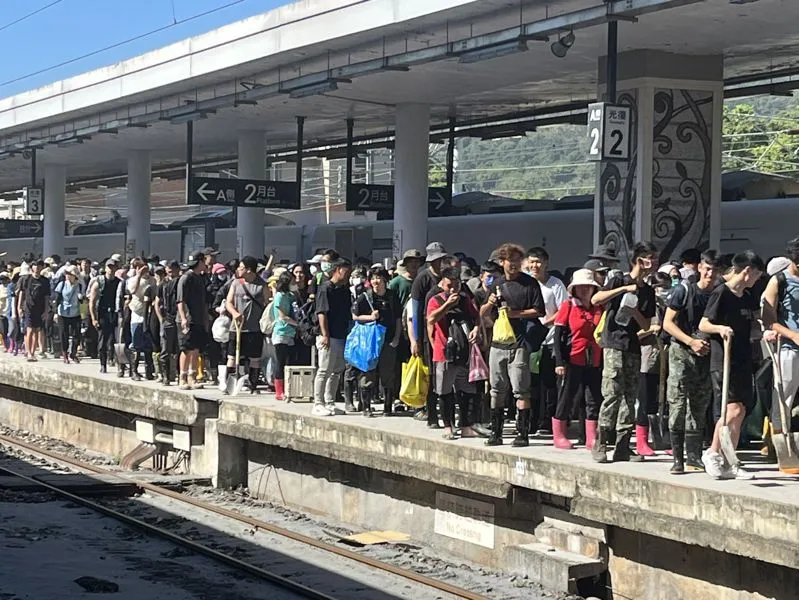
In the wake of Super Typhoon Ragasa, Guangfu Township in Hualien County was left reeling from severe flooding and landslides, particularly after the overflow of the Matai'an Creek’s barrier lake on September 23. Streets were buried under thick mud, homes inundated, and local infrastructure heavily damaged. As the community faced the daunting aftermath, a broad coalition of volunteers, medical teams, and local organizations mobilized to support survivors and begin the long process of recovery.

Mobilization and the Challenge of Recovery
Immediately after the disaster, local and national organizations—including the Tzu Chi Foundation—launched coordinated relief operations. On September 24, Tzu Chi Foundation's CEO, Po-wen Yen (顏博文), visited the affected areas to assess needs and initiated a large-scale volunteer mobilization. As of October 1, the relief operation had accumulated nearly 19,000 volunteer shifts dedicated to clean-up, with over 20,000 total volunteer mobilizations. Volunteers, dubbed “Shovel Heroes,” arrived in droves by train, equipped with buckets, shovels, and protective gear. With civilian clean-up coordination entrusted to Tzu Chi, all volunteers were systematically assigned to different zones for efficient and comprehensive clean-up.

Gathering at Hualien train station to reach Guangfu, a sense of camaraderie was palpable. As volunteers approached the station, more and more people could be seen walking in rain boots, greeting one another with friendly smiles and nods—all sharing a sense of mission and determination to contribute. Many had to stand shoulder to shoulder for nearly an hour on the train, but spirits remained high, united by a common purpose.
One of the most daunting challenges for both residents and volunteers was the removal of the thick, clay-like mud left behind by the floods. The mud was so dense and heavy that every step became a struggle. Volunteers often found themselves stuck, with boots trapped in the muck and feet coming out bare. Clearing this kind of mud required not only physical strength but also perseverance and teamwork, as shoveling and hauling it away was both exhausting and time-consuming. For example, in one home with a first floor of about 70 square meters, it took three full days to clear out all the mud and remove any rotten wood. In total, 60 volunteer shifts were needed—about 20 people working each day—to restore just this single household. The sheer weight and stickiness of the mud made even the simplest tasks, like removing furniture, a significant ordeal for everyone involved.


LEFT: Covered in mud, thousands worked hand-in-hand to clear debris and mud out of the homes. | Photo: Shih-Pen Lee (李士彬). RIGHT: Mud and damaged items are moved onto the streets to be cleared away by trucks. | Photo: Tzu Chi Foundation
Meeting Urgent Needs: Food, Shelter, and Medical Care
With thousands engaged in physically demanding clean-up work, providing nutritious meals became both a logistical challenge and a top priority. Over 32,000 hot meals were distributed to survivors and volunteers. The Ruisui Community Centre, recently opened, was transformed into a central kitchen and supply hub, where local volunteers prepared thousands of vegetarian meals daily, served in reusable containers to minimize waste. Among the volunteers were many who had previously received disaster aid themselves and now worked tirelessly to help prepare and distribute meals and refreshments.
In addition to meals, Tzu Chi and local businesses set up mobile kitchens near the train station, offering a range of hot foods and beverages to exhausted volunteers before they boarded the train home. Many community members and local restaurants also contributed by donating food and supplies, ensuring that both volunteers and survivors had the energy and comfort needed to continue their work.




Tzu Chi's kitchen volunteers gathered to make over 4,000 meal boxes each day to support affected residents and cleaning volunteers on the front line. | Photo: Tzu Chi Foundation
Medical teams from Tzu Chi's hospitals across Taiwan have played a crucial role in the response. Under the leadership of hospital directors such as Supt. Ning-Sheng Lai (賴寧生) and Supt. Jui-Teng Chien (簡瑞騰), medical professionals visited various households to deliver essential medicines and provide on-site care. As the recovery progressed, the demand for surgical and trauma care increased. Hualien Tzu Chi Hospital established three medical stations and a mobile medical team, treating over 1,200 people within the first six days, including more than 500 cases requiring wound cleaning and suturing.
The medical teams also ensured the availability of critical supplies, such as tetanus vaccines, which required careful cold storage and rapid distribution to the front lines. Recognizing the physical toll on both survivors and relief workers, the hospital’s traditional Chinese medicine department, in collaboration with the Hualien County Chinese Medicine Association, set up additional clinics to provide acupuncture, massage, and herbal remedies. These services helped address muscle fatigue and other ailments common among those working long hours in challenging conditions.


Medical personnel from Tzu Chi's hospitals helped with providing medical aid kits as well as treating the wounded. Doctors set up medical stations to help the survivors and volunteers injured during the cleanup. For the elderly and those unable to reach the stations, doctors trekked through mud to visit them in their homes. | Photo: Tzu Chi Foundation
Resilience and the Road Ahead
The disaster has tested the resilience of Guangfu’s residents and the broader Hualien community. Despite the scale of destruction—homes filled with knee-deep mud, personal belongings lost, and infrastructure damaged—there have been countless stories of perseverance and mutual support. Volunteers and survivors alike have found strength in working together, whether through clearing debris, preparing meals, or providing medical care.
As the immediate cleanup work continues while transitioning to long-term recovery, the need for ongoing support remains. Medical teams continue to provide care, while volunteers and local organizations focus on helping families rebuild their homes and restore a sense of normalcy. The collective response to the disaster has demonstrated the power of community action and the importance of compassion in times of crisis.






